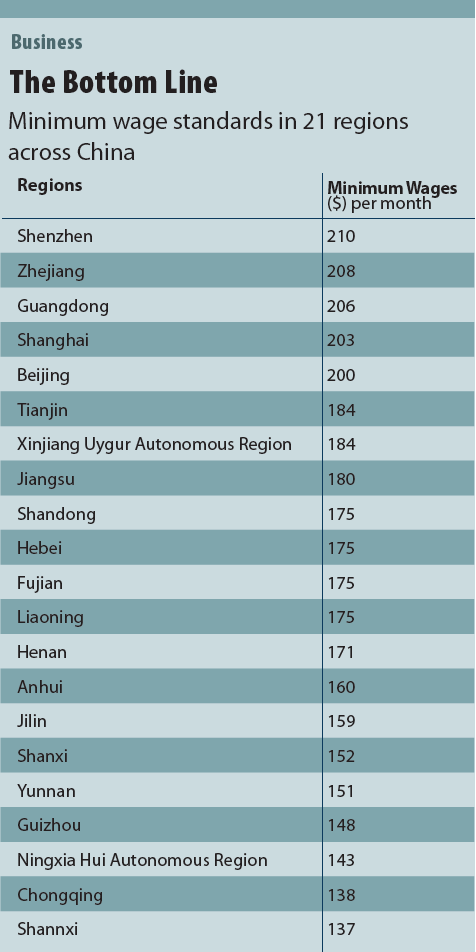|

Policy continuity
Wage increases are expected to continue in the long term, as the 12th Five-Year Plan for National Economic and Social Development (2011-15) targets an annual increase in the minimum wage level of no less than 13 percent.
According to figures released by the national employment promotion plan in February, the minimum wage should be lifted to at least 40 percent of the average local salaries by 2015.
Liu Junsheng, a researcher with the labor and wage institute affiliated with the Ministry of Human Resources and Social Security, said a continuous rise of the minimum wage will help increase the money in workers' pockets and therefore benefits their livelihood.
Meanwhile, the employment promotion guideline will facilitate labor absorption in the tertiary industry, especially for small and micro-sized firms in the industry, said Liu Yunfeng, Senior Investment Advisor with Datong Securities.
The growth in the cost of labor has increased competitive pressure for small and medium-sized enterprises.
"Earlier this year my factory raised the monthly salary by about 20 percent before Chinese New Year, from 2,500 yuan ($396) to 3,000 yuan ($476), in response to the severe labor shortage," said Wang Lianzhi, the owner of an air-conditioner factory in Beijing.
Wang said inflation feels are higher than the official figure as the labor costs are much higher than before.
The consumer price index (CPI), the main gauge for inflation, in January gained 4.5 percent year-on-year, compared with the predicted 4 percent.

Inflation fears
Some experts worried that rapid growth in wages would exacerbate inflation, which could lead to "a spiraling upward trend" in both wages and prices.
But Yao Jingyuan, former chief economist with NBS, disagreed. "Inflation worldwide is not primarily driven by the growth in minimum wage standards," he said. "It's a good thing that wages are being raised. It sets a bottom line for workers to guarantee their income."
Liu Yingqiu, Dean of the Graduate School of the Chinese Academy of Social Sciences, said it is reasonable to worry about the upward trend, because increased incomes will help spur consumption, and the rising purchasing power is then likely to push up the price of consumer goods. Yet a "growth in wages is not necessarily linked to inflation," he added.

|